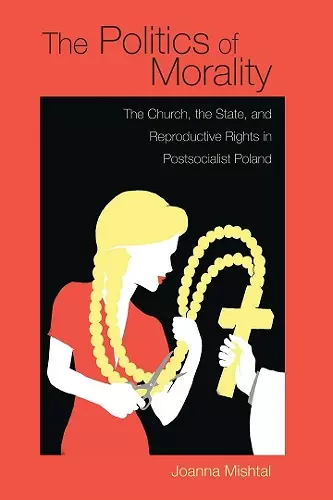The Politics of Morality
The Church, the State, and Reproductive Rights in Postsocialist Poland
Format:Hardback
Publisher:Ohio University Press
Published:15th Jul '15
Currently unavailable, and unfortunately no date known when it will be back
This hardback is available in another edition too:
- Paperback£23.99(9780821421406)

The Politics of Morality is an anthropological study of the expansion of power of the religious right in postsocialist Poland and its effects on individual rights and social mores.
After the fall of the state socialist regime and the end of martial law in 1989, Polish society experienced both a sense of relief from the tyranny of Soviet control and an expectation that democracy would bring freedom. After this initial wave of enthusiasm, however, political forces that had lain concealed during the state socialist era began to emerge and establish a new religious-nationalist orthodoxy. While Solidarity garnered most of the credit for democratization in Poland, it had worked quietly with the Catholic Church, to which a large majority of Poles at least nominally adhered. As the church emerged as a political force in the Polish Sejm and Senate, it precipitated a rapid erosion of women’s reproductive rights, especially the right to abortion, which had been relatively well established under the former regime.
The Politics of Morality is an anthropological study of this expansion of power by the religious right and its effects on individual rights and social mores. It explores the contradictions of postsocialist democratization in Poland: an emerging democracy on one hand, and a declining tolerance for reproductive rights, women’s rights, and political and religious pluralism on the other. Yet, as this thoroughly researched study shows, women resist these strictures by pursuing abortion illegally, defying religious prohibitions on contraception, and organizing into advocacy groups. As struggles around reproductive rights continue in Poland, these resistances and unofficial practices reveal the sharp limits of religious form of governance.
“One of the many strengths of Mishtal’s study is that she doesn’t just describe a top-down model of power—she also focuses on everyday women of different economic classes and how they negotiated the legal and cultural restrictions on abortion and contraceptives.… I have been raving about this book to anyone who will listen.” * Cosmopolitan Review *
“One of Mishtal’s most important contributions is her analysis of the gendering of biopolitics in Poland and the ways the Catholic Church has undertaken a politics of morality based on individual surveillance and political intimidation. Methodologically sophisticated, innovative, and refreshingly free of jargon, this is an important work.”
“This excellent, insightful ethnography contributes important analysis to studies on Poland’s most recent history as well as anthropology of reproduction and women’s studies. Since ‘Poland is emblematic of the pivotal role of gender in nation-making (197),’ it is also the must-read book for scholars and students interested in gender studies.” * Social Anthropology *
“Refreshingly incisive … A compelling ethnographic account… Mishtal's book will interest scholars of feminist activism, political transitions, and political religion as well as anthropologists of Poland and of reproduction. Her very accessible prose makes this book suitable for a wide audience, including undergraduates.” * Anthropologica *
“This is the book I have been waiting for. … Meticulously researched and beautifully written … The rich data, critical yet balanced analysis, and comprehensive historical and cultural background all create an invaluable insight into the female experience in twenty-first-century Poland.…This is by far the best book about women in Poland I have ever read.” * Journal of Contemporary Religion *
“This well researched and important book, which succeeds not only as a case study of a particular Polish paradox and its localized effects, but also as a broader exposition of the contradictions of the democratization process. Crucially, the book also happens to come at a particularly pertinent moment in history, given Poland’s recent political upheavals, which threaten to limit further women’s rights and access to reproductive health services. Given its accessibility, the book would be of interest to specialist and non- specialist audiences.” * Journal of Contemporary Central and Eastern Europe *
“Mishtal provides a very thorough account of a series of church and state attempts to curtail women’s reproductive rights … She does a great job in analyzing various discourses on a given subject…” * Journal of Church and State *
“A powerful book on postsocialist Poland from a perspective of gender policies and women’s reproductive practices…. (Mishtal) presents a compelling analysis of what it means when religious institutions, in this case the Catholic Church in Poland, affect state policies and intrude on everyday life of believers and nonbelievers alike. The stakes for women are especially high.” * The Polish Review *
“Mishtal’s book is a compelling and horrifying account of how Polish institutions intervened and gained command over women’s lives, and how women have been losing control over who will have access to their bodies and the circumstances that warrant that access. A must-read for all who are interested in one of the most contested aspects of transformational politics in Poland—reproductive rights.”
- Winner of Adele E. Clarke Book Award 2017
ISBN: 9780821421390
Dimensions: unknown
Weight: unknown
272 pages